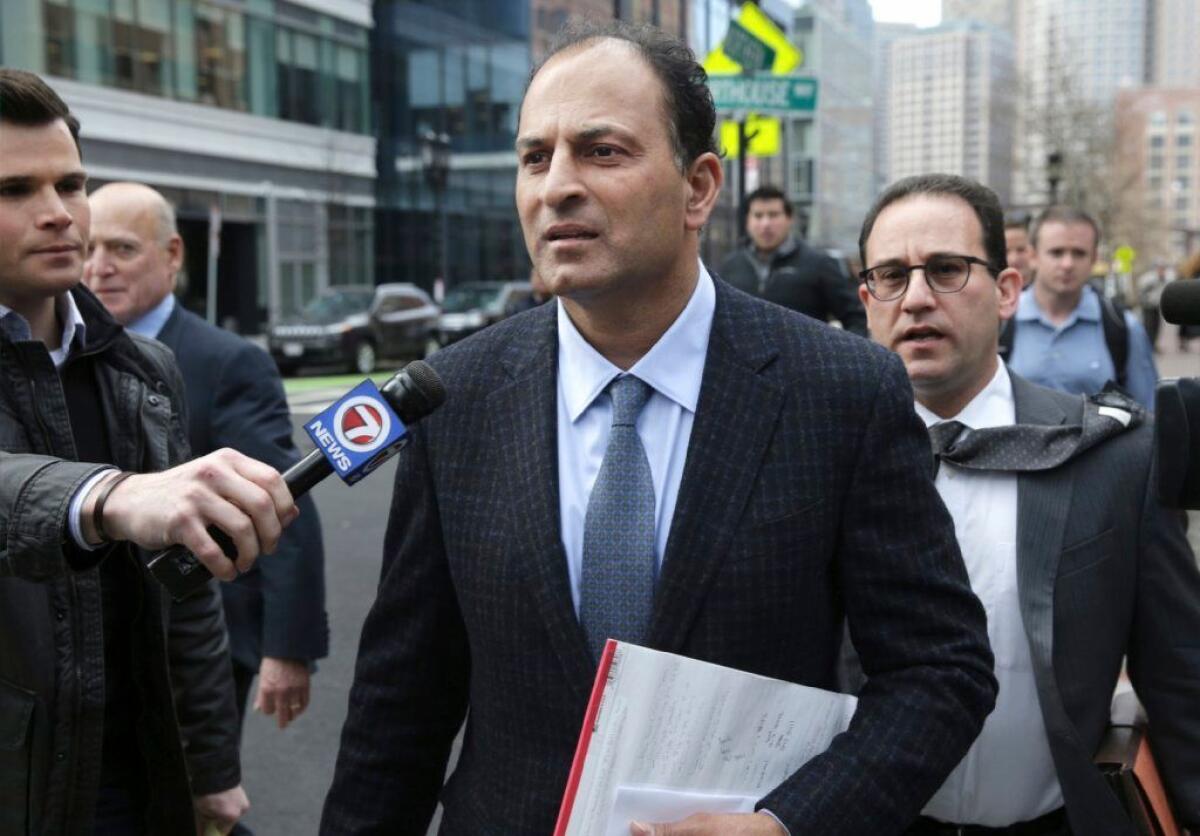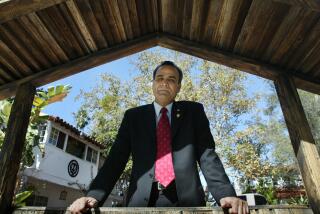Admissions scandal: David Sidoo, former Canadian football player, sentenced to 90 days in prison

David Sidoo, whose career as a professional football player, stockbroker and venture capitalist has been overshadowed by the revelation he paid $200,000 to fix his sons’ college entrance exams, was sentenced Wednesday to 90 days in prison.
Sidoo, a Canadian citizen who lives in Vancouver, pleaded guilty in March to a single count of conspiring with William “Rick” Singer, the Newport Beach consultant at the center of the admissions scandal, to rig his two sons’ SAT entrance exams. Federal prosecutors dropped a money-laundering charge against him in exchange for Sidoo acknowledging he’d committed fraud.
Sidoo is one of 28 parents charged by the U.S. attorney’s office in Boston to have acknowledged their guilt. Another 10 have maintained their innocence and are moving toward a pair of trials, the first of which is scheduled to begin Oct. 5 in Boston. The case’s highest-profile defendants — actress Lori Loughlin and her fashion designer husband, Mossimo Giannulli — pleaded guilty in May and were slated to be sentenced on Aug. 21.
Before being sentenced, Sidoo apologized to his family, his colleagues, his former coaches and the children he had mentored. “You deserved better,” he told them.
“I hope that in time, people will not judge me for the worst moment in my life,” he said.
U.S. District Judge Nathaniel M. Gorton, ruling from Boston by videoconference, said he was “appalled” that Sidoo, a respected businessman and philanthropist, was standing before him to be sentenced for a felony. Sidoo was undeniably generous and had mentored many young people, the judge said, and yet in conspiring with Singer, he had “displayed an unbelievable lack of morality, integrity and common sense.”
Gorton ordered Sidoo to report to prison on Sept. 23. In addition to serving his prison term, Sidoo must pay a $250,000 fine.
In a series of indictments and other documents filed in court, prosecutors described how Sidoo worked with Singer to fix his sons’ exams and falsify their college applications. His criminal conduct was prolonged and “not a one-off lapse in judgment,” Justin D. O’Connell, an assistant U.S. attorney, said during the sentencing hearing.
In 2011, Mark Riddell, Singer’s Harvard-educated accomplice, used a fake ID with his face and Sidoo’s older son’s name to take the SAT in Vancouver. Because the boy had previously earned a 1460 out of 2400 possible points, Singer told Riddell not to aim too high, an indictment says. He notched a 1700, and Sidoo paid Singer $100,000, prosecutors wrote in a sentencing memo.
Singer and Riddell have each pleaded guilty to several felonies and have yet to be sentenced.
Riddell would return to Vancouver to take the boy’s high school graduation exams, the indictment said. Sidoo’s son was admitted to Chapman University in Orange and later transferred to USC, prosecutors wrote in the memo.
In 2012, Riddell took the SAT for Sidoo’s younger son. Because the boy hadn’t previously taken the test, Riddell scored a 2280 out of 2400, and Sidoo paid Singer another $100,000, according to the indictment.
Singer also drafted an essay, brimming with falsehoods, that Sidoo’s son submitted to several schools, the indictment said. An early draft described the boy being held at gunpoint by a Los Angeles street gang, only to be rescued by a rival gang member named “Nugget,” Eric S. Rosen, an assistant U.S. attorney, wrote in a memo.
When Singer emailed the draft to Sidoo, he wrote back, “Can we lessen the interaction with the gangs. Guns....? That’s scary stuff.” The final draft made no mention of guns, the indictment said.
Sidoo’s younger son was admitted to UC Berkeley.
Several years later, Sidoo and Singer discussed having Riddell take either the GMAT, for admission to an MBA program, or the LSAT for law school on behalf of his older son, according to the indictment. Riddell went so far as to purchase a fake driver’s license from a supplier in China, but the plan fizzled when the ID arrived and turned out to be “not of high quality,” the indictment said.
In a sentencing memo of his own, Sidoo’s lawyer, Martin G. Weinberg, described his client as a father “who made a tremendous mistake, out of misplaced love for his sons, that is inconsistent with his entire personal life story.”
Sidoo had already been punished to a certain degree, Weinberg wrote: His reputation has been tarnished, his awards have been revoked, his board seats relinquished and his name removed from the football stadium of his alma mater, the University of British Columbia.
Sidoo played six seasons in the Canadian Football League as a defensive back for the Saskatchewan Roughriders and British Columbia Lions, according to the British Columbia Sports Hall of Fame, into which Sidoo was inducted in 2017.
Dozens of Sidoo’s friends and business associates submitted letters to Gorton, the judge, attesting to his good deeds and remorse for his admitted crimes. Among them was a letter written by Warren Moon, the Hall of Fame quarterback who played for the Houston Oilers, among other teams.
Although he competed against Sidoo in the Canadian Football League in the 1980s, Moon didn’t get to know Sidoo until three decades later, when an AAU basketball coach introduced the two, he wrote. “We both care deeply for young people, sports and education,” Moon said.
Sidoo funded 40 scholarships — $200,000 in all — to help kids go to college or pursue other post-high school education, Moon wrote. Sidoo served as a mentor to many of them. “His passion and his presence have a value that doesn’t have a price tag,” Moon said.
More to Read
Sign up for Essential California
The most important California stories and recommendations in your inbox every morning.
You may occasionally receive promotional content from the Los Angeles Times.










